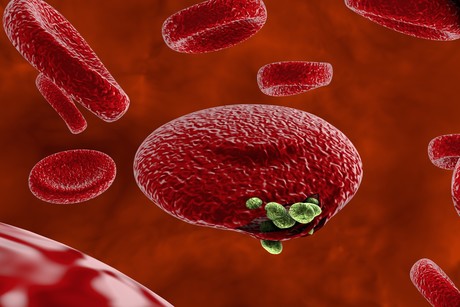Research opens new pathways for vaccine development

Burnet Institute researchers have identified a novel process used by the immune system to kill and clear malaria.
The research, led by PhD student Liriye Kurtovic and supervised by Burnet’s Head of Malaria Research, Professor James Beeson, establishes that antibodies produced by the immune system interact with important proteins in the blood called complement to block the ability of malaria to establish infection.
The study also demonstrates that some children naturally develop high levels of these antibodies after malaria infections, which appear to protect them from malaria. “Studies have already shown that antibodies on their own can inhibit malaria, but we found that if antibodies recruit complement proteins this inhibitory activity was greatly increased,” Kurtovic said.
“Even when antibodies were tested at low concentrations, adding complement enhanced the overall effect.
“So if you could refine antibody responses to make them better at interacting with complement, this could substantially enhance their ability to prevent infection and potentially prevent clinical malaria disease.”
The study findings, published in the journal BMC Medicine, have the potential to inform the development of much-needed highly effective malaria vaccine. RTS,S — the leading vaccine candidate that targets malaria before it infects the liver — provides only partial protection: 36% in children and 28% in infants.
The World Health Organization has set an ambitious goal to license a malaria vaccine that is at least 75% efficacious against clinical malaria by 2030.
“These findings have revealed a new mechanism of immunity that we can exploit to develop a much more effective and long-lasting malaria vaccine,” said Professor Beeson.
The global malaria burden reduced substantially between 2000 and 2015, but this trend has plateaued over the past few years because of increasing drug and insecticide resistance, and other factors. Of the annual estimated 200 million cases of malaria globally, around 500,000 result in death.
Kurtovic said avenues for further investigation include an evaluation of RTS,S to determine whether the vaccine can effectively induce functional antibodies, and how this relates to vaccine efficacy.
“One-third of the world’s population is at risk of malaria, so an effective vaccine is the ultimate end game with the potential to save millions of lives,” she said.
This research was conducted in collaboration with Radboud University Medical Center, Nijmegen, the Netherlands; Case Western University, Cleveland, USA; Kenya Medical Research Institute; Papua New Guinea Institute for Medical Research; and the Walter and Eliza Hall Institute, Melbourne.
Retinal health linked to dementia risk, study shows
Researchers have discovered that the blood vessels at the back of the eye — called retinal...
Pancreatic cancer hijacks metabolism switch to help it spread
Pancreatic cancer hijacks a molecule known for regulating physiological processes, such as food...
Novel antibiotic activates 'suicide' mechanism in superbug
Researchers have discovered a new class of antibiotic that selectively targets Neisseria...




